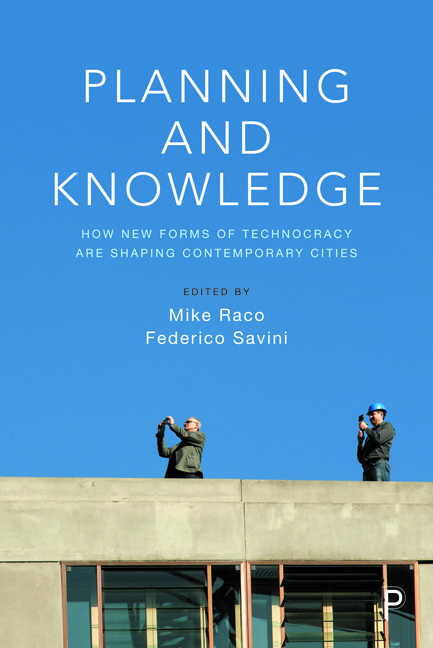Book contents
- Frontmatter
- Contents
- List of figures
- List of tables
- Notes on contributors
- Part I Conceptual framings of technocracy
- Part II Public planning and bureaucracies in contemporary urban development politics
- Part III Corporate knowledge and the land and property development sector
- Part IV Private consultants and the delivery of public policy
- Part V New constellations of actors and the management and governance of contemporary cities
- References
- Index
3 - Dealing with tensions: the expertise of boundaryspanners in facilitating communityinitiatives
Published online by Cambridge University Press: 30 April 2022
- Frontmatter
- Contents
- List of figures
- List of tables
- Notes on contributors
- Part I Conceptual framings of technocracy
- Part II Public planning and bureaucracies in contemporary urban development politics
- Part III Corporate knowledge and the land and property development sector
- Part IV Private consultants and the delivery of public policy
- Part V New constellations of actors and the management and governance of contemporary cities
- References
- Index
Summary
Introduction
In this chapter, we investigate the tension betweenbureaucratic expertise and situated knowledge in thecontext of social innovation. We address thefrictions that emerge internally in publicorganisations when they attempt to respond to localdemands of social innovation, citizen's engagementand democratic participation. Our contribution to acritique of contemporary technocratic urbanmanagement and planning lies in identifying the keyaxes of internal conflict between publicprofessional expertise and the situated knowledge inurban neighbourhoods. We particularly look at theactions of ‘boundary spanners’, and theirnarratives, to examine the role of a newprofessional profile within public organisations.Boundary spanners work across organisationalboundaries developing a specific expertise which isinstituted to connect the internal working ofbureaucracies with the external demands and needs ofactors in particular urban areas.
Throughout Europe, organisations with a public task aimto facilitate community initiatives, as these arebelieved to strengthen citizens’ capabilities andcommunity cohesion, as well as contributing to moretailored responses to the local context and needs(Boonstra and Boelens, 2011; De Wilde et al, 2014;Edelenbos and Van Meerkerk, 2016). Communityinitiatives are collaborative activities by citizensthrough which they provide community goods orservices based on their own motives and under theirown conditions (Bakker et al, 2012; Denters, 2016).Examples include citizens starting communitygardens, setting up local sustainable energycompanies or organising community activities toincrease interaction between neighbours.Facilitating such initiatives will entail publicprofessionals serving the ambitions of citizens andgenerating conditions which support communityinitiatives in realising and managing theirinitiative, such as providing means, networks andintellectual support (Oude Vrielink and Van deWijdeven, 2011). However, a facilitating role comeswith complicating tensions as the informal andaction-oriented logic of community initiatives (CIs)are often at odds with the formal andprocedurally-oriented logic of organisations with apublic task (POs) (Van Dam et al, 2014). Forinstance, there is a tension between acting fast toretain the enthusiasm of initiators andsimultaneously carefully aligning the initiativewith the policies and interests of the PO, tosupport the initiative more sustainably. In thischapter we analyse such tensions and explore howboundary spanners, who provide POs with specificexpertise in facilitating CIs, can make tensionsproductive.
- Type
- Chapter
- Information
- Planning and KnowledgeHow New Forms of Technocracy Are Shaping Contemporary Cities, pp. 33 - 46Publisher: Bristol University PressPrint publication year: 2019

